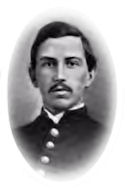 June 13th. There was much excitement just before daylight this morning, the rebels opening a tremendous cannonade on Sumner’s headquarters, creating a general stampede in that direction. All the troops fell in and remained in line, till the firing ceased; our big guns in the new redoubts and forts replied and made a terrific row. It was all wasted ammunition, I suppose; no losses on our side, at any rate. Weather very hot, so we sent to the woods for pine boughs, and had them placed in front of our tents; to keep the sun off. Seth made some fine seats of inverted cracker boxes, and we can now sit outside under the shade of the pines, and get the air. How many men are killed every day on the picket line, from the fire of the sharpshooters? It does no good, and has not the most remote effect upon the ultimate result, is barbarous, and ought to be stopped. Got a furlough for Quartermaster Sergeant Smith to-day, and made out field returns. In the evening we lay under our fine shade trees, and sampled some Rhine wine brought up by the sutler; found it good; got hold of a Richmond paper to-day, containing an account of the fight of the thirty-first and first, from the rebel point of view. They admit there was great confusion on the night of the first, and that they fully expected us to follow them up. It was a serious mistake we did not do so; they must have been demoralized by the great change in affairs on the first; on the thirty-first they had considerable success, capturing Casey’s camp and stores, two or three batteries, and drove back all the reserves brought up to oppose them, until night stopped the fighting. The following morning everything was reversed; they lost all they had gained the previous day, leaving their camp equipage and dead and wounded in our hands, and lost heavily all along the line; nothing prevented a great disaster to the Confederacy on the first but the timidity of McClellan; officers and men were ready and anxious to advance, and would, if allowed to have done so, followed the enemy directly into their works. Colonel Bailey, the chief of artillery of Key’s corps, was killed on the first. I knew him when he first joined the army, after graduating from West Point. He was a splendid specimen of the genus homo, and married to one of the most beautiful women I ever saw, one of Major Patten’s daughters, of Fort Ontario, Oswego. He was a fine officer, and his death is a great loss to the service.
June 13th. There was much excitement just before daylight this morning, the rebels opening a tremendous cannonade on Sumner’s headquarters, creating a general stampede in that direction. All the troops fell in and remained in line, till the firing ceased; our big guns in the new redoubts and forts replied and made a terrific row. It was all wasted ammunition, I suppose; no losses on our side, at any rate. Weather very hot, so we sent to the woods for pine boughs, and had them placed in front of our tents; to keep the sun off. Seth made some fine seats of inverted cracker boxes, and we can now sit outside under the shade of the pines, and get the air. How many men are killed every day on the picket line, from the fire of the sharpshooters? It does no good, and has not the most remote effect upon the ultimate result, is barbarous, and ought to be stopped. Got a furlough for Quartermaster Sergeant Smith to-day, and made out field returns. In the evening we lay under our fine shade trees, and sampled some Rhine wine brought up by the sutler; found it good; got hold of a Richmond paper to-day, containing an account of the fight of the thirty-first and first, from the rebel point of view. They admit there was great confusion on the night of the first, and that they fully expected us to follow them up. It was a serious mistake we did not do so; they must have been demoralized by the great change in affairs on the first; on the thirty-first they had considerable success, capturing Casey’s camp and stores, two or three batteries, and drove back all the reserves brought up to oppose them, until night stopped the fighting. The following morning everything was reversed; they lost all they had gained the previous day, leaving their camp equipage and dead and wounded in our hands, and lost heavily all along the line; nothing prevented a great disaster to the Confederacy on the first but the timidity of McClellan; officers and men were ready and anxious to advance, and would, if allowed to have done so, followed the enemy directly into their works. Colonel Bailey, the chief of artillery of Key’s corps, was killed on the first. I knew him when he first joined the army, after graduating from West Point. He was a splendid specimen of the genus homo, and married to one of the most beautiful women I ever saw, one of Major Patten’s daughters, of Fort Ontario, Oswego. He was a fine officer, and his death is a great loss to the service.
Diary of Josiah Marshall Favill.
Previous post: Woolsey Family during the War.
Next post: Drowned Out and Starved Out


